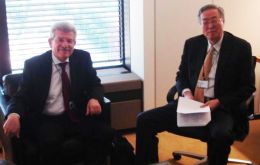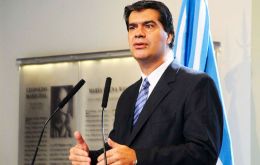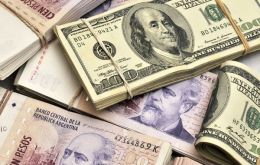MercoPress. South Atlantic News Agency
Tag: Argentine Central Bank
-
Thursday, October 2nd 2014 - 07:15 UTC
Climbing volatility of the US dollar in Argentina forces resignation of central bank president

Argentine Central Bank President Juan Carlos Fabrega resigned Wednesday after an alleged disagreement with President Cristina Fernandez over how to keep a lid on the black market exchange rate ('blue' dollar) that hit a record 16 pesos per dollar last week.
-
Tuesday, September 30th 2014 - 05:11 UTC
Argentine reserves below 28bn dollars; bonds payments of 170m on Tuesday

The informal of “blue” dollar in Argentina fell back 15 cents to 15.55 Pesos after it skyrocketed 75 cents last week and scraping 16 Pesos. The formal US dollar meantime advanced three cents to 8.49 Pesos at the end of trading in Buenos Aires City banks and foreign exchange offices. The gap between the two rates dropped to 83.9%.
-
Wednesday, September 10th 2014 - 06:59 UTC
Argentina plays the China card to bolster reserves: 800m pledged in first tranche

The Argentine Central Bank foreign reserves would be bolstered this year with up to 800 million dollars in Yuans transferred by China due to the first tranche of the money of the swap agreement signed between both countries, according to banking sources in Buenos Aires.
-
Monday, September 8th 2014 - 06:35 UTC
China aids Argentina: a billion dollars in Yuan pledged by end of the year

Argentina's central bank chief, Juan Carlos Fabrega, met his Chinese counterpart Zhou Xiaochuan in Basilea, Switzerland on Sunday to discuss how a currency swap worth billions of dollars will be put into action, the Argentine monetary authority said.
-
Thursday, September 4th 2014 - 05:06 UTC
Argentina milks more US dollars from commercial banks

Argentina's central bank said on Wednesday it had reduced the amount of dollars commercial banks could hold, a move that should push more greenbacks into the spot market and may give a mild boost to flagging reserves and the local Peso.
-
Thursday, August 28th 2014 - 06:11 UTC
Dollar new record in Argentina: 14.45 Pesos; Capitanich blames 'speculative attacks'

While Argentine Cabinet Chief Jorge Capitanich claimed the country was suffering “speculative attacks“ to systematically erode the ”government’s credibility and trust” the US dollar in the Buenos Aires informal market continued to climb and ended Wednesday trading 25 cents higher at 14.45 Pesos.
-
Thursday, August 14th 2014 - 06:11 UTC
Argentina: US dollar reaches a new record of 13.15 Pesos in Buenos Aires 'blue' market

The US dollars climbed to a record 13.15 Pesos on the black or 'blue' market on Wednesday trading as fears mount regarding the outcome of the holdout bonds conflict with the New York court. The official dollar rate closed at 8.2750 Pesos.
-
Tuesday, July 29th 2014 - 05:13 UTC
Dollar in Argentina climbs to 13 Pesos and the stock market drops 1%

The “blue” dollar on Monday spiked 40 cents, to 13 Argentine pesos, amid growing uncertainty over the negotiations between Argentina and its holdout creditors in New York, as the July 30 deadline set by US Judge Thomas Griesa approaches.
-
Tuesday, June 24th 2014 - 04:26 UTC
Argentine economy contracts 0.2% in first quarter; 2013 growth down to 2.9%

Argentina's economy contracted during the first quarter of the year as high inflation and weak exports to top trade partner Brazil took a toll. During the first three months of the year, GDP fell by 0.2% on the year and contracted 0.8% on the quarter, the national statistics agency Indec reported Monday.
-
Wednesday, June 18th 2014 - 08:09 UTC
S&P and Argentina in six months: “default or distressed debt exchange”

Standard & Poor's cut its rating of Argentina's long-term foreign currency debt rating to CCC- from CCC+ with a “negative” outlook. A CCC rating is defined as “currently vulnerable and dependent on favorable business, financial and economic conditions to meet financial commitments,” according to S&P.
